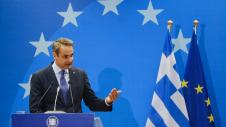A draft election law bill that restores the "bonus" seats for the top party in the elections will be tabled in Parliament within January, Prime Minister Kyriakos Mitsotakis announced in a five-page interview covering a broad range of issues that was published by the newspaper "To Vima" on Sunday.
In this, he asked voters to consider what would have happened if simple proportional representation had been in effect for the 2019 elections and whether they would want a New Democracy-SYRIZA alliance, which would have been the only way to arrive at a majority in parliament.
"Would this not amount to altering and distorting the mandate they had just delivered," Mitsotakis asked, adding that a strong mandate must result in a strong government.
Should the draft bill fail to be passed by 200 votes in parliament, he noted, the next elections in 2023 will very likely lead to a hung parliament and repeat elections.
Mitsotakis also referred to relations with Turkey and its President Recep Tayyip Erdogan during the interview, noting that Greece has nothing to fear from a recourse to the international court at The Hague.
While Greece wanted and still wants good neighbour relations, friendship and dialogue with Turkey, he said, "this does not mean that Greece will not defend its sovereign rights with all the means at its disposal, activating a very dense network of diplomatic initiatives in order to repel the Turkish side's latest illegal actions, which are outside of international legality and common sense."
Turkey's recent choices have left it exceptionally isolated, Mitsotakis pointed out, unlike Greece, whose positions are always based on upholding international law and have met with universal acceptance and the support of a host of countries, while at the same time boosting its deterrent strength.
Asked if Athens was planning to take the matter to the international court of justice, the prime minister replied affirmatively.
"I think that, yes, we must state clearly that if we are unable to reach an agreement, then we must agree that the sole difference recognised by Greece should tried by an international judicial forum, such as the International Court at The Hague. And to be absolutely clear, I am referring to the delimitation of the continental shelf and the maritime zones in the Aegean and the Eastern Mediterranean. If we believe - and we do believe - that we have right on our side, then we have nothing to fear as a country from this development," he said.
Mitsotakis noted that resort to The Hague required absolute certainty that Greece had right on its side but also a complete willingness to accept the final decision of the international court. "An initiative of this kind will have the support of all the political forces. It is necessary that this happens. Judging by the public statements of the other parties, I do not see any substantial objection," he said.
On his upcoming visit to the White House and the meeting with U.S. President Donald Trump, the Greek premier said that Greece and the U.S. were now "closer than ever" and that Greece, as a reliable ally of America, expects that this be confirmed through actions, not just words.
"We can deepen our defence cooperation even further, for example in the sector of drones. We will also begin a discussion on eventually acquiring F-35 aircraft, once fiscal conditions permit," Mitsotakis said. He hailed the vote on the East Med Act as a "historic development" and said that U.S. support for the East Med pipeline acknowledged the necessity of diversifying energy supply sources to Europe. Combined with the Alexandroupolis Floating Storage and Regasification Unit (FSRU), this placed Greece well and truly on the global energy map, he added.
"With President Trump we will talk about investments. He is known for his business acumen. I am certain that he won't want American businesses to miss the opportunity of participating in Greece's success story!" Mitsotakis added.
Turning to domestic issues, the prime minister rejected criticism that his government was attempting to curtail the rights to strike and protest:
"The very few cannot determine the daily life of the many because that is unfair. We will equally, therefore, defend the right of the single citizen to protest but also the right of the others to live, work, move around. With rules...there will be rules in the context of organised protests," he said.
On the changes to the law on calling strikes, he said these will "protect the right to strike in a modern framework."
Responding to main opposition criticism that his government was reviving "clientelism" and the state-supported business models of the past, Mitsotakis insisted that the government was not reproducing the problems that had caused the crisis in Greece.
"A government is judged as a whole....where there were mistakes or wrong choices, these were fixed: at my personal orders, 13 hospital governors were subjected to second-level scrutiny and replaced. I don't accept, however, that this government makes 'allowances' regarding the ability of executives in the state machinery," he said.
Questioned about allegations of excessive use of force and "humiliating treatment" of arrested persons by the police, the prime minister expressed his full support for both the police and the citizen protection minister, Michalis Chrisochoidis. One of his pre-election pledges, he pointed out, was that the police would be given the freedom to do their job, "and that is what we are doing as a government."
Acts of misconduct by individual police officers will be investigated and dealt with, he said, adding: "At some point we must come to realise that in an organised state, the monopoly on legal violence is held only by the state. In fact, it is not exercised by choice but by necessity, for the common good."
Mitsotakis also spoke of a need to speak up for those whose lives were being disrupted: "What are these incidents? Are they isolated? No. They are generalised and they must stop...democracy knows how to act and react, to protect but also to protect itself," he said, while stressing that terrorism, in particular, "will be crushed - not stamped out but crushed!"
On economic issues, Mitsotakis revealed that the government intends to officially request the lowering of primary surplus targets in the first half of 2020, so that this can be included in the 2021 budget. He also appeared certain that further reductions of the 'solidarity levy' will be possible in 2020.








